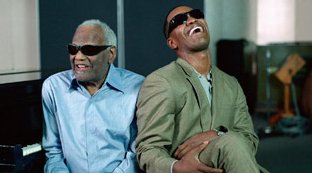RAY CHARLES' BIOGRAPHY
Singer Ray Charles was born on September 23, 1930 in Albany, Georgia. Raised in Greenville, Florida Charles was introduced to blues music at an early age. When he was seven years old, he went blind from glaucoma. From 1937 to 1945, he attended the St. Augustine School for the Deaf and Blind. While there, he learned to play the piano, saxophone, and studied composition.
At fifteen, Charles began performing in clubs around Florida. In 1948, he set out for Seattle, Washington where he formed the Maxim trio, a jazz-blues group. In 1949, the group had their first hit song, "Confession Blues" on the Downbeat label.
In 1952, Charles signed with Atlantic Records. Charles’ style was unique. He combined the patterns of gospel music and blues. His most popular hits on this label included, Things That I Used to Do," I Got a Woman," "Hallelujah I Love Her So," and "Drown in My Own Tears."
In 1959, Charles signed with ABC-Paramount. On this label, his hits included, "Georgia On My Mind," “Ruby,” "I Can't Stop Loving You," and "Take These Chains From My Heart".
In the 1960s, Charles made some new endeavors. He formed the Ray Charles Enterprise, which was comprised of Tangerine Records, Tangerine Music, and Racer Music Company. He also broke into the film business. He made appearances in films such as Swinging Along, Ballad in Blue (1966), The Cincinnati Kid, (1965) and In the Heat of the Night (1967).
The 1980s were also memorable for Charles. In 1982, he was inducted into the Blues Hall of Fame and in 1986 he was inducted into Rock and Roll’s Hall of Fame. Charles also received a Lifetime Achievement Award at the 30th Annual Grammy Awards and a Lifetime Achievement Award from the Songwriters Hall of Fame. In 1989, he teamed up with Chaka Khan for the hit song, “I’ll Be Good to You.”
On June 10, 2004, Charles died in his Beverly Hills home due to complications from liver disease.